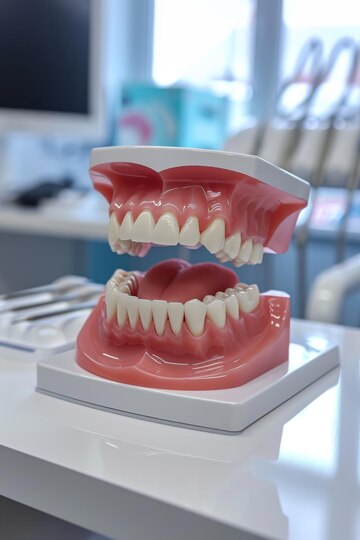Dentures are artificial teeth that replace lost ones, ensuring your mouth retains its normal functionality and natural appearance. They are designed to fit your mouth accurately and hence can be made from diverse materials, including metal or porcelain. The following is an overview of dentures:

TYPES OF DENTURES
- A complete denture is used when all teeth have been removed in either the upper or lower jaw or both.
- Conventional complete dentures are made after the removal of the remaining teeth and healing of gum tissues, which might take many months before being placed into the mouth.
- On the other hand, immediate complete dentures are manufactured earlier, allowing for placement immediately upon extraction, but may necessitate modification during healing.
- A partial denture is provided when there are existing natural teeth.
- Partial dentures consist of false teeth attached to a pink or gum-coloured plastic base, which a metal framework may connect.
- Besides filling in spaces left by missing teeth, they also prevent other teeth from shifting position.
- Dental implants support these dentures as they attach to them.
- The conventional type uses adhesives, while others do not require this because it uses dental implants, unlike most types.
- These can either be fixed or removable, depending on what suits you best.
DENTURE-MAKING PROCESS
01.Initial Consultation
Talk about your oral health with your dentist and consider different options for getting new dentures made. They determine the shape and size of dentures by making an impression on your mouth.
02.Creating the Dentures
In this case, the dental lab uses these moulds to make a wax model or digital design for your new teeth. You may even have a try-out appointment where you can see if both shape, colour and fitting are good with the denture before it is finalized .
03.Final Fitting
Some minor changes are made until one feels comfortable wearing them. The last step involves designing final dentures, which are fitted onto your gums.
04.Adjustments & Follow-Up
In some instances, after fitting in, one has to come back for adjustment to ensure that one acquires comfort. Regular examinations help maintain the proper functioning of the dentures and also ensure that they fit perfectly in their position.
BENEFITS OF DENTURES
Improved Appearance
Aesthetically, dentures give you back your tooth look and smile completely, just as natural teeth did some time ago.
Enhanced Functionality
This helps you to eat better, thus enhancing proper nutrition, which in turn supports general oral health improvement.
Versatility
Whether you have lost only a few or all your teeth at once, this type could be very helpful as it works for any extent of tooth loss.
Non-Invasive Option
Unlike implants, some people prefer non-invasive options such as dentures, which are best suited for this group of people.
CONSIDERATIONS
Adjustment Period
You should not expect to feel accustomed to it once you have them in your mouth for the first time. There may be some initial discomfort, increased saliva and minor speech changes that are common while wearing dentures.
Maintenance
Dentures must be cleaned every day, maintained in cleanliness, and kept in good condition throughout their entire life span. A denture cleansing solution can effectively keep them fresh and moist when soaked overnight.
Regular Check-Ups
It is necessary that one visits the dentist regularly to check if the dentures still fit and are in good condition. The mouth changes naturally, so some adjustments or replacements may be necessary over time.
